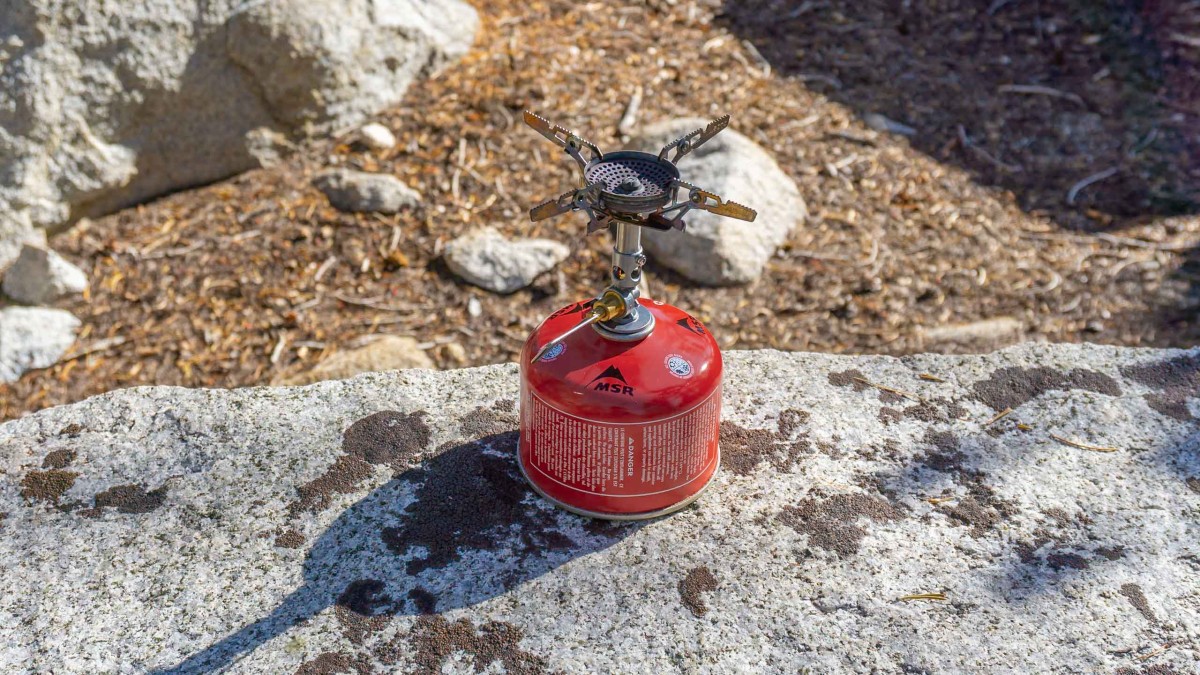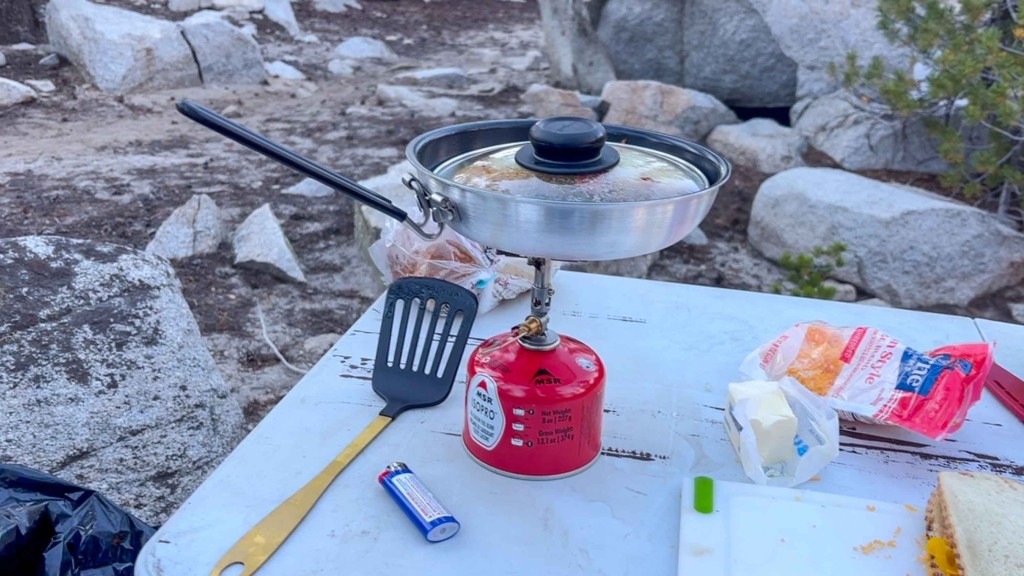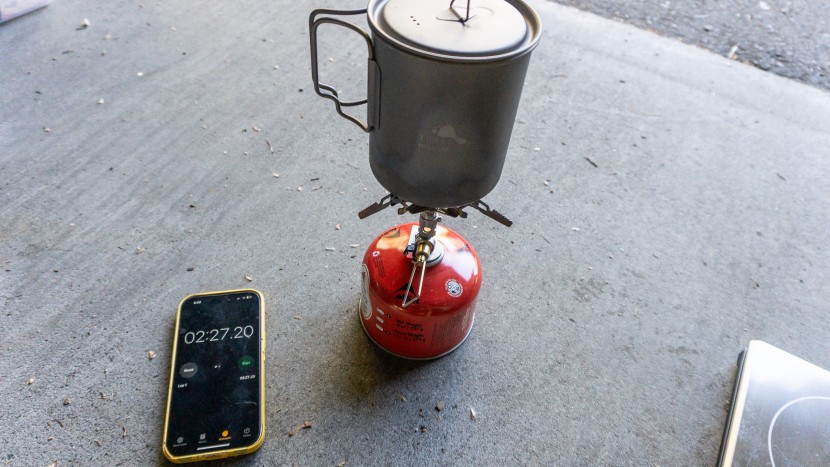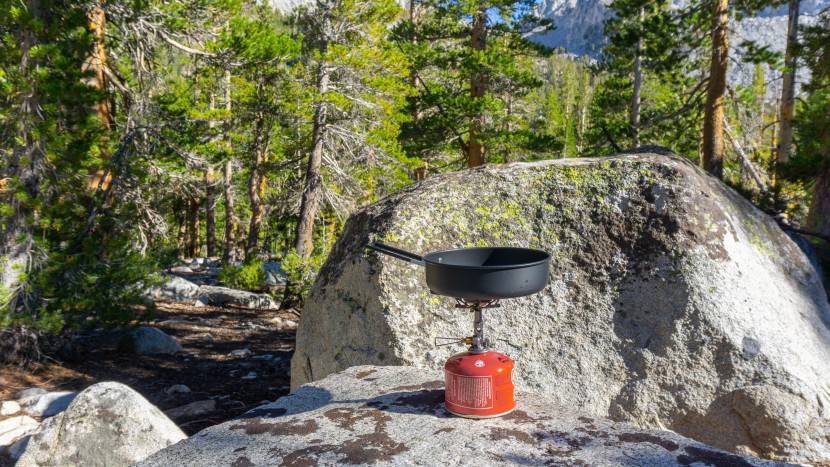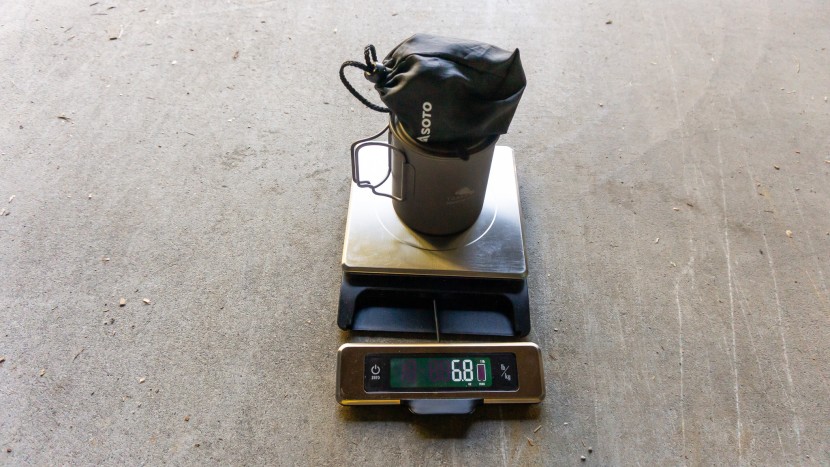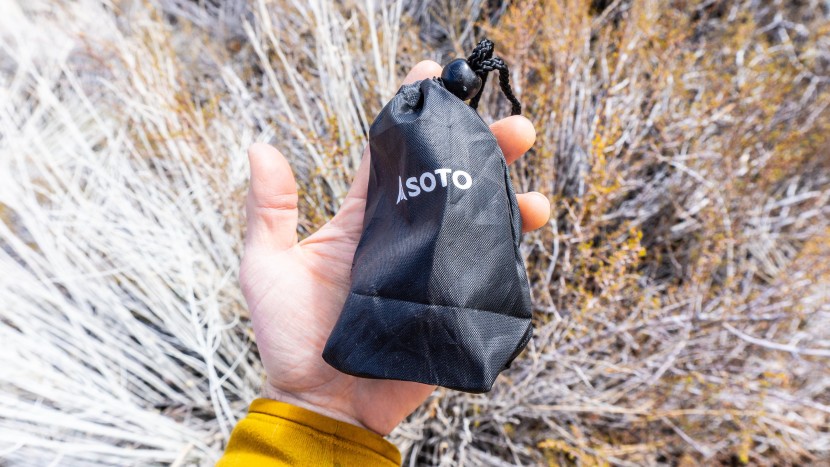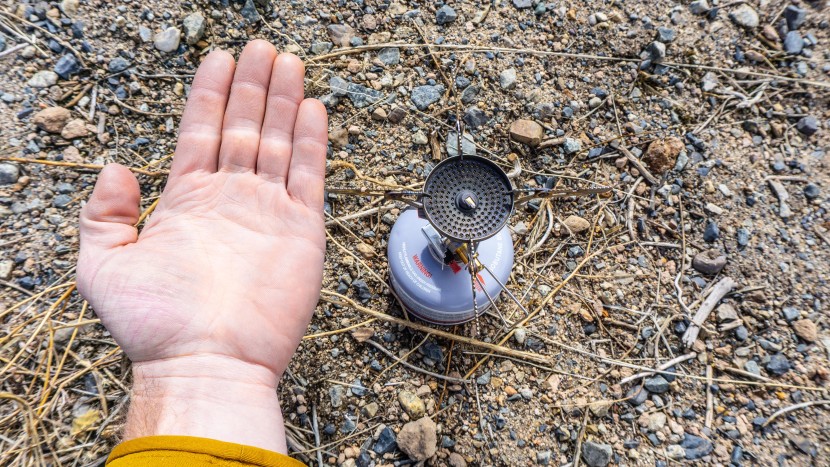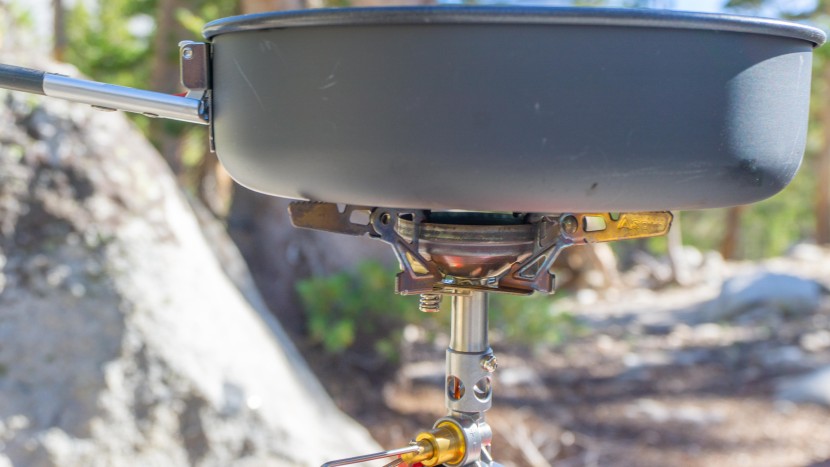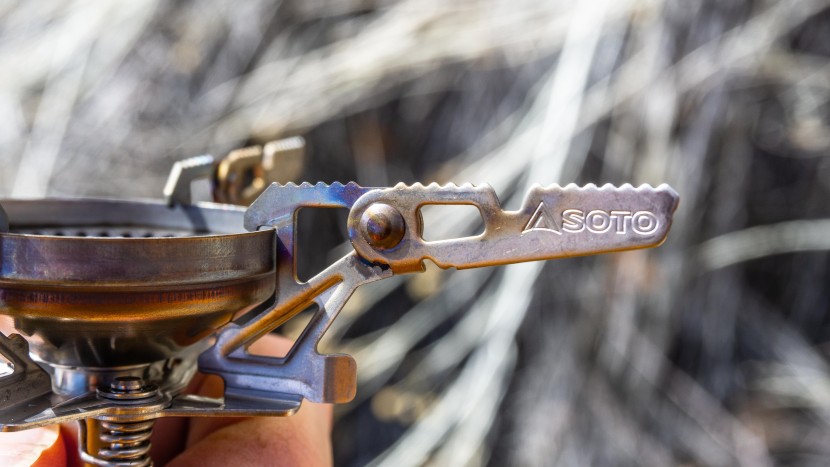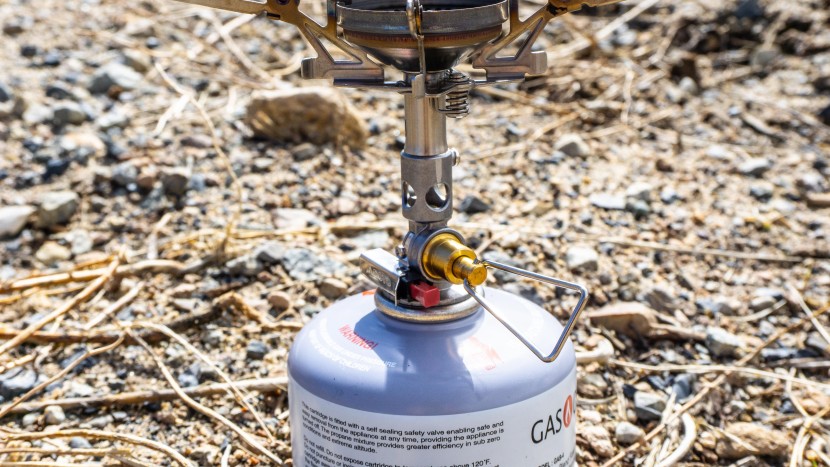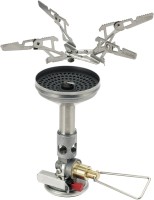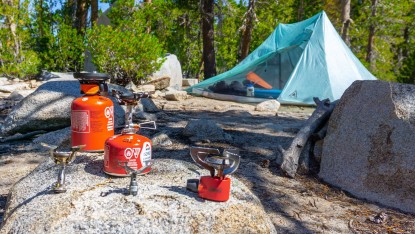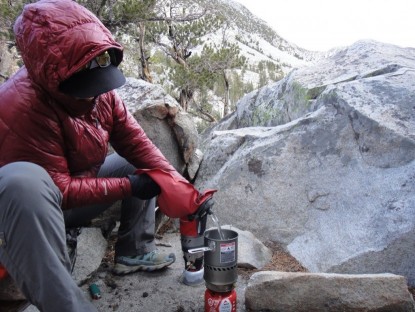
Our Verdict
Our Analysis and Test Results
Established in 2010, Soto is a fairly new Japanese outdoor company (Soto means “outdoors” in Japanese), but its parent company has produced torches and commercial stoves for decades. Soto has gained an impressive reputation for making lightweight, reliable, and fuel-efficient backpacking stoves. The WindMaster stove distinguishes itself as a very high-performing small canister stove that's particularly dependable in the wind. We particularly loved its versatility: it's excellent for anything from simmering to boiling water.
Fuel Efficiency
Despite the Windmaster being a small canister stove rather than a model with an integrated pot, it was relatively efficient at heating up a pot of water. This is unlikely to be your first choice if prioritizing top-shelf efficiency, but for those wanting to make skillet meals, we think you'll be happy with its performance.
The WindMaster uses around .24 ounces of iso-propane per boil, which puts it slightly above average fuel efficiency in our lineup. When making more involved meals in a pan, we found that this option continued to offer fuel-efficient cooking, making it ideal for a wide variety of meals, whether sauteeing veggies or just boiling water for a dehydrated dinner. We were particularly impressed with the WindMaster's efficient performance in windy environments, which can otherwise cause a stove's fuel efficiency to plummet.
Weight
The Windmaster stove in its bag weighs a scant 3.8 ounces. We measured each stove's “essential weight”, which included a lightweight Toaks pot, which brought the weight to 6.8 ounces. While it's common to see a trade-off between weight and performance, this Soto model proves you can sometimes have it all.
It's compatible with two different pot supports: the 4Flex (which is what we tested) and the Triflex, which only has three support arms and weighs a bit less. Considering the wind resistance and simmering capabilities of this stove, its weight is excellent.
The WindMaster also offers decent packability, easily fitting inside a backpack or pot without trying too hard.
Simmering Ability
If all you ever eat in the backcountry is instant food, skip this section. If, on the other hand, you've been thinking about making noodles or investing in a frying pan to make an egg scramble, or even frying up some fish you caught with that ultralight fly rod, then this metric is for you. The WindMaster excels in its simmering capabilities.
The WindMaster offers an excellent simmer relative to its size, allowing our backcountry chefs to cook a variety of meals in a wilderness setting. While the valve is a bit sensitive, we were able to get the stove just barely on without it blowing out – an essential attribute for sauteing or cooking noodles. Another quality that contributes to good simmering is the size of the burner head. The WindMaster sports a burner head that's about 1¾ inches across. This is one of the larger burners for a small canister stove, which helps distribute heat across cookware and leads to fewer scorched spots in the middle of the pan.
Wind Resistance
While most open-burner models are more susceptible to wind, the Windmaster was surprisingly high-scoring in this metric. There are bigger and badder models in the lineup, but none of them offer the lightweight all-around performance of the Windmaster.
In fan testing, the Windmaster saw an approximately 15% reduction in fuel efficiency when compared to sheltered settings. As was the case with many stoves, we found a much less noticeable effect from wind when using a skillet, with much less firepower required to make a meal. When boiling water at more exposed camps, we saw much slower boil times from the Windmaster, but found the fuel consumption to remain similar to our baseline lab testing.
Ease Of Use
The WindMaster saw a lot of field time with our testing team and is one of the easier to use stoves in our review. We don't want to spend valuable backcountry time messing around with our stove. We, like you, want something straightforward and reliable.
Our testers don't like keeping track of dinky parts and prefer stoves that require as little assembly as possible. Our review team shared their biggest grievance: “The pot supports are not permanently attached to the stove and can be finicky to put back on if they fall off.” Nevertheless, the pot stabilizers are big, sturdy, and easily support cookware larger than 1 liter. The control valve wire is about 1.5 inches long and is typically easy to locate. However, it can get tricky to find the wire when you pair the stove with larger cookware.
The piezoelectric igniter on the WindMaster worked almost every time. We took many trips with this as our only stove and rarely needed to use the lighter in our backpack, but we always recommend bringing a lighter, no matter how reliable these on-board igniters have gotten over the years.
Should You Buy the Soto WindMaster?
Though it is one of the more expensive small canister stoves in our test, the combination of low weight and generous pot supports gives the WindMaster added versatility, which boosts its value. We think the high performance, clever features, and reliability of this stove make it worth the money and worthy of your consideration, particularly if you need a model that can cook more involved meals.
What Other Backpacking Stoves Should You Consider?
If you like the Soto brand but need something smaller than the WindMaster, consider its little sibling, the Soto Amicus, which is also cheaper. If you want an integrated canister stove but want to keep it lightweight, check out the Jetboil Stash.
| Awards | Best Overall Backpacking Stove |
|---|---|
| Price | $70 List Check Price at REI |
Overall Score  |
|
| Star Rating | |
| Bottom Line | This versatile option is one of our favorite small canister stoves, providing the best performance for most camping needs |
| Pros | Decent weight-to-performance ratio, impressive wind resistance, excellent simmering capability, large pot supports |
| Cons | Pot supports aren't attached to stove, noisy, not as compact |
| Rating Categories | Soto Windmaster |
| Fuel Efficiency (25%) | |
| Weight (25%) | |
| Simmering Ability (20%) | |
| Ease of Use (15%) | |
| Wind Resistance (15%) | |
| Specifications | Soto Windmaster |
| Weight | 3.8 oz |
| Type | Small canister |
| Fuel Type | Isobutane |
| Additional Included Items | Stuff sack, pot support |
| Piezo Igniter | Yes |
| Measured Essential Weight | 6.8 oz |
| Dimensions | 4.7" x 3.9" x 3.6" |
| Boil Time .5 liters | 2 min 27 sec |


